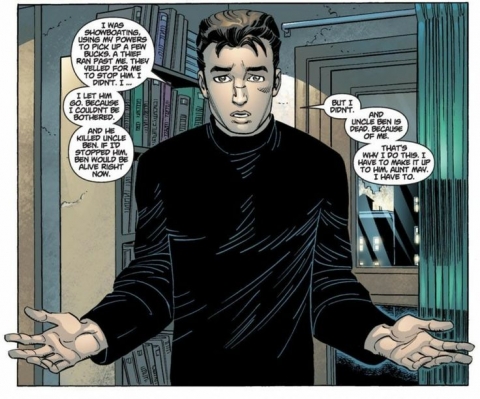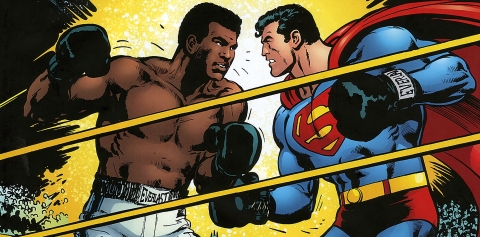52 weeks. 52 different writers. 2 trade paperbacks or hardcovers a week. Each week I’ll take a look at a different writer and read two different collected editions from within that person’s repertoire to help in the examination of their work.
Peter David refers to himself as “writer of stuff”. He is hands down the most well known X-Factor writer, having multiple stints writing the book. Back in the mid-2000’s, David and the book would be cast in the spotlight for his decision to cast the characters Shatterstar and Rictor into a homosexual relationship, a decision that drew a strong mix of criticism and praise. All of it would culminate in being awarded a GLAAD Media Award for Outstanding Comic Book in 2011. Peter David would return to working on X-Factor in 2014 and then later in the year return to Spider-Man 2099 as well, placing him in a rare instance where he was writing these two titles at the exact same time much like he did over a decade ago with the former incarnations of X-Factor and Spider-Man 2099.
All-New X-Factor Vol 1: Not Brand X
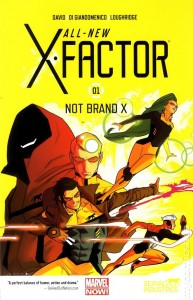 Serval Industries undertakes the suspicious task of developing the first corporate superhero team. The new X-Factor is completely dedicated to working only for Serval Industries in any way that will best benefit them. Polaris, Quicksilver, and Gambit all come together to become the founding members of this new X-Factor team for Serval Industries. Dealing with everything from techno organic beings to mad scientists, the All New X-Factor has their work cut out for themselves as they try to help further Serval Industries interests while also learning to trust each other.
Serval Industries undertakes the suspicious task of developing the first corporate superhero team. The new X-Factor is completely dedicated to working only for Serval Industries in any way that will best benefit them. Polaris, Quicksilver, and Gambit all come together to become the founding members of this new X-Factor team for Serval Industries. Dealing with everything from techno organic beings to mad scientists, the All New X-Factor has their work cut out for themselves as they try to help further Serval Industries interests while also learning to trust each other.
Peter David’s new take on X-Factor is wildly refreshing from your average X-Men book, or even your average superhero book at that. David redefined the team back in the mid-2000’s by making them a detective like team and shifts the focus to a corporate mindset this time around. In making this cast of X-Factor a gathered corporate team instead of a team that gathers through adversity to save the world you get to see personalities clash or mesh in a different manner than what you’d expect. For teams like the Avengers the characters are all vastly different but tend to put their differences aside to save the world and better mankind. X-Factor is a team that doesn’t work on that “world saving” scale though and as such, they don’t need to put their differences aside to save the day so much as just learn to tolerate each other. It takes a few issues for this story to really find that rhythm that sets it apart but once it does, All New X-Factor becomes a thoroughly enjoyable read.
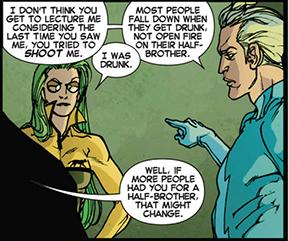
In trying to do something different, X-Factor takes some liberties in areas you wouldn’t expect and sharply turns where your average team comic would continue to march on forward. David realizes that not every issues needs to end, or even feature, a ginormous, continent shaking, bone rattling fight sequence. Instead David wisely chooses his moments to really strike and does a great job of getting his characters across as individuals. That’s not to say that there aren’t plenty of fast paced fight scenes, because there are, it’s just that they never feel like the most important part of what this comic is about. Sudden and unexpected resolutions are where this comic really finds its stride as plenty of the issues end in a manner that upsets the flow of what you’ll find in books like X-Men or The Avengers. The things the team face off against and how they “win” the day aren’t always as simple and easy as punching it until it starts or stops working. As such Peter David finds more than a few moments to do something different and keep X-Factor fresh and exciting, even if it doesn’t necessarily start that way.
The bad thing about All New X-Factor is that its title might be a bit of a lie. Although it boasts “All New” in the front, it definitely feels rather self referential. Yes, there are a lot of new concepts at play but if you haven’t kept up to date with some of the past X-Factor stuff or even a bit of the X-Universe over recent years you will feel lost at times. I’m no X-Men savant but I was still able to recognize some of the character being referenced throughout with throwbacks to the New Mutants and such but even then, if you’re just coming into this series without any prior X-Men knowledge you’re sure to feel disappointed. If you are looking to jump into the X-Men universe for the first time ever, try to not make your first experience All New X-Factor.
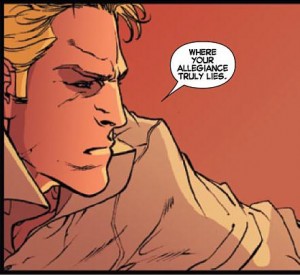
Peter David does a solid job of bringing together some lower tier X-Men characters to put together this new X-Factor team. Although incredibly popular, Gambit is a character that has never really had many standout stories nor has he really succeeded in carrying his own solo series for too long of a time. Nonetheless, David throws in Gambit with the likes of Polaris and Quicksilver, with both characters being similar to Gambit in the sense that they’re popular but oft misused or misplaced. After assembling his core three members, David gets the chance to plug in other characters who are like the three I just mentioned. By the end of the volume, the team roles six members deep with plenty of variety between most of the main characters although there are two specific characters who seem like perfect matches for each other yet odd additions to the team separately because of their abilities being somewhat similar. All around Peter David still crafts a fairly interesting cast of characters who will hit plenty of high notes amongst fans.
The dynamic between your core three characters of Gambit, Polaris and Quicksilver is plenty of fun to watch occur as you see friction between the two male leads while the female lead gets along with both of them somewhat well. The sibling nature shared between Polaris and Quicksilver does set them at odds and makes for some great dialogue between the two characters. Gambit and Quicksilver are rather untrustworthy to each other with Gambit constantly suspecting Quicksilver is up to no good. The dynamic between these two characters specifically is one of the better parts of the entire collection as watching them butt heads only to reluctantly work together in the end can be a real blast. With Polaris and Gambit there is a soft spoken nature filled with respect between the two characters. There are moments when they seem at odds only to reel it back in. While on the topic of characters, I’d be amiss to not mention Harrison Snow, the enigmatic owner of Serval Industries. Snow is rather similar to someone like Tony Stark, being a wealthy industrialist with a suave nature. Although Snow has a villainous feel to him there isn’t much revealed in the way of his plans or motivations, leaving an air of mystery surrounding the character and keeping the readers intrigued for every scene he pops up in.

Collects: X-Factor #1-6.
Best Character: Quicksilver.
Best Line Of Dialogue/Caption: “The phrase “No More Mutants” brings bad memories with it.” – Quicksilver.
Best Scene/Moment: Gambit’s poor cats. – Issue 3.
Best Issue: Issue 4. This issue is without a doubt Peter David putting his best foot forward and telling a story that you just can’t put down. It features a classic X-Men character who isn’t widely popular but still well liked going against the core three members of X-Factor. It’s high action, high reward with a clever little ending that epitomizes why the All New X-Factor is such a solid series. Sometimes you don’t need to punch things ’til they’re fixed to make a superhero story work.
Why You Should Read It: Peter David takes a cast of relatively B-List and lower characters and makes an interesting story centered around them. It’s the fun character work as well as David’s unconventional resolutions that make All New X-Factor worth reading. It’s a short little series that flew largely under the radar because of it’s so-so first couple of issues. Although the series doesn’t open strongly, by volume’s end you’ll be fully invested in what David is attempting to do.
Spider-Man 2099 Vol 1
Peter David is easily the definitive Spider-Man 2099 writer. H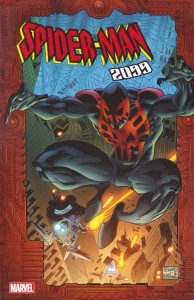 e’s the man who has done the most work towards not only creating the character but also developing him. David created the character alongside artist Rick Leonardi back in 1992. The two men would work together sporadically for several years on the book, maintaining great success. In 1996, David abruptly departed the book, along with several other writers of the Marvel 2099 books at the time, following the firing of then editor Joey Cavalieri. The editors all left there books in a stance of solidarity over the firing with many of the 2099 books ending shortly thereafter. David would return to the character of Spider-Man 2099 in 2014 due to his recent reintroduction in the regular Amazing Spider-Man title.
e’s the man who has done the most work towards not only creating the character but also developing him. David created the character alongside artist Rick Leonardi back in 1992. The two men would work together sporadically for several years on the book, maintaining great success. In 1996, David abruptly departed the book, along with several other writers of the Marvel 2099 books at the time, following the firing of then editor Joey Cavalieri. The editors all left there books in a stance of solidarity over the firing with many of the 2099 books ending shortly thereafter. David would return to the character of Spider-Man 2099 in 2014 due to his recent reintroduction in the regular Amazing Spider-Man title.
In the year 2099, wiz geneticist Miguel O’Hara works for Alchemax, trying to develop “Corporate Raiders”, genetically enhanced humans who work under the thumb of Alchemax. When the head of Alchemax, Tyler Stone, demands more compelling results from Miguel, he poisons him with the highly addictive drug Rapture. Without many options, Miguel uses his research as a way to try to cure his sudden and unexpected addiction. Using the genetic layout for Spider-Man, Miguel’s attempt to cure himself go awry when his jealous corporate rival, Aaron Delgado, sabotages hi equipment. The malfunction result in Miguel inheriting many of Spider-Man’s amazing powers and even developing a few new ones of his own.
Peter David introduced a whole new style of Spider-Man to readers back in the 90’s when he co-created the character of Spider-Man 2099 with artist Rick Leonardi. To fit in with the times of 90’s, David introduced a cockier, edgier man under the mask, giving the world Miguel O’Hara. O’Hara is written as a less humble style of Peter Parker, with tons of brains but still questionable morals. David gleefully plays with the idea that Miguel has yet to learn that fateful Spidey lesson of “with great power comes great responsibility”. As such, there are more than a few scenes where you see Miguel make decisions that fly completely in the face of everything the modern Spider-Man stands for. That is essentially what makes Spider-Man 2099 so interesting, it keeps with some classic traditions of Spider-Man but for the most part it’s an entirely different style of Spider-Man.
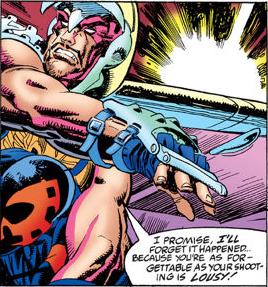
As I said above, Miguel is a far cry from the loveable and dorky Peter Parker. If anything, Miguel is close to the polar opposite of Peter, as many character close to him are quick to point out, referring to him as “self centered” or only out for himself. Even with his new found super powers, Miguel doesn’t immediately develop a need to use the powers for good or to help other people. It isn’t until he sees unnecessary violence unfold in front of his very eyes that his heroic nature begins to slowly form. Spider-Man 2099 doesn’t deal with much street level crime, something that Peter Parker not only deals with on a daily basis but also cut his teeth on. As such it’s a slow build towards becoming a selfless hero and it doesn’t even occur in this whole volume. Miguel maintains a reputation of being hard to find, much like Peter Parker, but is a condescending jerk at the same time, making his dry wit a sharp contrast from the quirky quips of Peter Parker. His rude nature isolates him a lot from the other supporting members of the cast at times, causing them to point to Spider-Man 2099 as a shining example of what being a good man is in comparison to Miguel, even though the characters never realize they are one in the same.
Peter David builds a fairly standard secondary cast around our hero Miguel, drawing on characters like Gabriel, Miguel’s brother, Dana, his fiance, and Tyler Stone, his boss. Each of these three characters have somewhat large roles to play in the story, in their own interesting way. Gabriel is the younger brother who thinks Miguel is a complete and utter jerk yet still supports him. He shows concern for his brother and his recent change in attitude but also turns to his brother without hesitation when his girlfriend falls into trouble with The Specialist, a futuristic samurai. Peter David tries to cast Gabriel in a bit more of a responsible role, reserving your average sibling ladder. Even still, he tries to reflect the youthfulness of the character through some of his impulsive life decisions. Ultimately, the biggest difference between Gabriel and Miguel falls upon the fact that Gabriel is rather cowardly wherein Miguel is just brash and smug. Dana, Miguel’s fiance, doesn’t get as much time to shine in this volume but does make a few odd decisions during her scenes. There are more than a few moments where there’s some romantic tension mentioned between Gabriel and Dana, making you wonder why the two aren’t an item even though it’s hinted they were once upon a time. Nonetheless, Dana seems like a perfect fit for someone like Miguel, as she is a no nonsense type of girl who is quick to try and put Miguel in line.
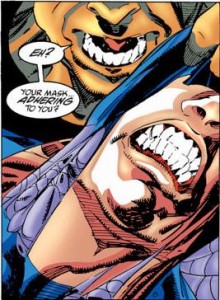
When we look on the villain side of characters, there is definitely an interesting collection of them that David chooses from. The previously mentioned Tyler Stone, head of Alchemax, is definitely what you could consider the main antagonist as he threatens Spider-Man 2099’s existence for his own gain. Throughout this first batch of stories, Tyler Stone remains rather enigmatic but still comes off as a scoundrel, doing whatever it takes to get his own way. There are hints that there could be someone even larger pulling the strings behind Stone but he still serves as a great face for the suggested primary villain. Other than Stone, Spider-Man mainly faces off against three villains, Venture, The Specialist and The Vulture. Both Venture and The Specialist are rather mundane one-note villains who don’t really threaten Spider-Man 2099 so much as just serve as catalysts to set up larger story beats. When Peter David sinks his claws into the 2099 version of the classic Spidey villain, the Vulture, is when things get a little bit more interesting in the villain department. David initially sets up Vulture as a man seeking out Spider-Man 2099’s unique abilities to help him with his own gain but then goes further to use him as a way of doing a bit of world building, establishing the fact that there are different social classes and gangs like the Freakers or Thorites. Ultimately, Vulture helps to really showcase the difference between Spider-Man and Spider-Man 2099.
The best part of David’s story with the first collection of Spider-Man 2099 stories is the way he tackles different ideas that he still uses in his writing today. David spends quite a fair amount of time here talking about corporations and how they basically run everything. As it is beautifully highlighted during a climatic battle between Vulture and Spider-Man 2099, David gets across that the bigger companies devour the smaller ones and leave the scraps for the consumers. Every smaller bit of this story gets swallowed up into the larger bits, with those larger bits specifically being tied to the Alchemax Corporation. It’s great stuff on the David’s behalf to tie his overall message rather subtly into the general narrative only to then wave it in your face during the Vulture story.
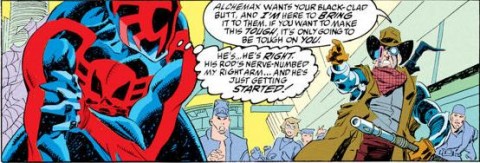
Collects: Spider-Man 2099 #1-10.
Best Character: Miguel O’Hara.
Best Line Of Dialogue/Caption: “There was a horrible man in black, and he went through there. Okay, Lyla? Good girl.” – Lyla.
Best Scene/Moment: Vulture talks about his shared philosophy with Spider-Man 2099 – Issue 7.
Best Issue: Issue 2. Issue 2 is part of the opening arc of this collection of stories that sets out to really establish the origin for Miguel O’Hara as Spider-Man 2099. This issue gives you a great sense of what Miguel O’Hara is all about and gives him a chance to really shine with his new powers. All this plus we get to see the building of a bit of the secondary cast and David’s wit, humour and charm are on full display throughout.
Why You Should Read It: Before Ultimate Spider-Man came along in the new millennium there was Spider-Man 2099, a wildly different, futuristic take on everyone’s favourite wall-crawler. Peter David gives the reader the polar opposite of Peter Parker, showing us that being an upstanding citizen isn’t necessarily a requirement for being Spider-Man. To see a character that is a jerk still be a loveable hero is such a joy and there’s few writers who could do it as well as Peter David does here.


